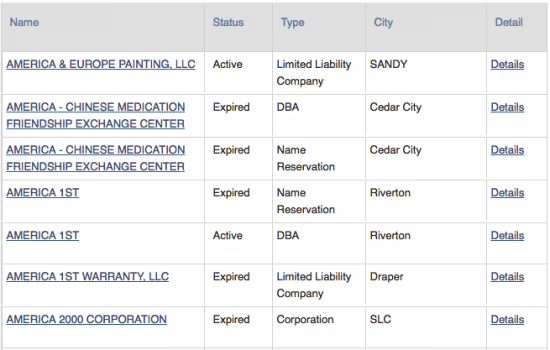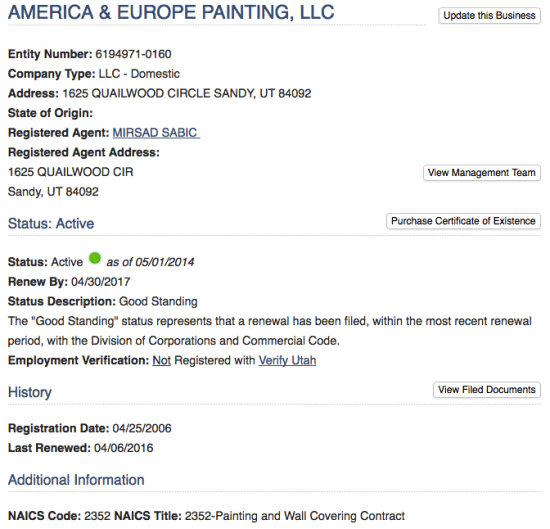Starting a new business can be both exciting and scary at the same time, you know? Like, you’re buzzing with ideas, doing market research, and crunching numbers, but one thing stands out: getting your business officially registered. When it comes to business entity searches in Utah, registered your company is an important step. It all comes down to making sure you’re following the rules, dotting your i’s and crossing your t’s. So, understanding each step of the registration process is critical. What about this guide? It’s your road map for not only getting your business licensed in Utah, but also making the entire process less intimidating.

Utah’s Business Entity Search Explained
Utah’s online business entity search provides public access to important registration and compliance documents filed with the state by all types of businesses in exchange for statutory fees. The Utah Department of Commerce operates the business search, which includes the following information:

Business name, status, registration number, registered agent, and incorporation date.
Business types include corporations, limited liability companies, partnerships, sole proprietorships, and so on.
Company leadership names of directors, officers, managers, and general partners.Addresses registered office address and principal office address.Legal standing – Good standing status, dissolution date (if applicable).
Statutory documents include articles of incorporation/organization, amendments, and mergers.
Financial statements for certain entities, such as non-profits and benefit corporations.
Search Utah Business by Name
Step: Looking up a company by its name is a common way to learn more about it. To get started, simply go to this website and type the name of the business into the search bar.

Step: After you search, you will see a list of entities that match your search terms on the following page. You can scroll through the list to find the exact business you’re looking for. It will display information such as the business’s status, type (LLC or corporation), and location. To learn more about the business, click on its name or the ‘Details’ link.

Step: On the final page, you will find information about the entity’s location, status, and filing history. Clicking the appropriate link will allow you to either update the business information or purchase a Certificate of Existence.”

How Utah Business Entity Search Integrates With State Records

Utah business entity search seamlessly integrates company registrations and documentation filed on a regular basis with government agencies in accordance with state statutes to ensure public transparency.
- The Utah Division of Corporations issues corporate formation certificates and maintains records.
- The Utah Department of Commerce monitors annual and periodic company compliance reports.
- The Utah Tax Commission accepts entity tax returns, renewal applications, and ownership updates.
- The Utah Labor Commission administers licenses, permits, and workers’ compensation data.
- Utah’s money service providers must register with the Utah Department of Financial Institutions
In essence, Utah business search centralizes all critical data related to an entity’s legitimacy, compliance, management, and financial performance, which is stored across multiple state government record-keepers and is constantly updated.
Exploring the Utah Business Entity Search Database
Utah provides two primary ways to search its extensive business entity database online for company information and records:

The first method allows you to look up an individual entity using its registration name or number. You can also search by business type, location, or status. This is most effective when the company’s exact registered name or corporation number is known ahead of time.
The second method allows for a more comprehensive industry search by categorizing SIC codes by economic sector, such as Agriculture, Services, and Finance. Further filters by employee count and location narrow down the database pool to more relevant entities.
Search by Utah Business Number
Step : Because each business only has one number, searching by entity number produces the quickest results. Simply go to the online search, enter the entity number, and click the search button to proceed.

Step: Once you enter the entity number, you will be able to view detailed information about that entity, such as its status, type, and location. For more information, simply click on the business name or the Details link on the right.

Step: On the final page, you will find information about the entity’s location, status, and filing history. If you need to update the business information or purchase a Certificate of Existence, simply click the appropriate link on the right.

Understanding Company Standing: Defunct, Active, and Good Standing
A Utah business search reveals whether a registered entity is defunct, active, alive, in good standing, delinquent, or reinstated. What do these terms represent?
- Defunct – Entity dissolved because it failed to comply with state laws, such as filing returns or making regulatory submissions.
- Active – The company has submitted all necessary documentation as required by law.
- Good Standing – An active registered entity is fully compliant with state legal and tax requirements.
- Delinquent – Temporary irregular compliance; yet to address overdue statutory submissions.
- Reinstatement – following defunct status, completed all pending compliance duties to resume active status.
The above designations have a direct impact on a company’s eligibility for state permits, licenses, and incentives, so they must be reviewed prior to making any major business decisions.
The Function of Business Entity Search in Strategic Decision Making
Utah’s comprehensive and constantly updated business entity search plays a critical role in enabling well-informed, low-risk decisions regarding the state’s complex corporate landscape.
- Industry Analysis – Search by sector, location, etc. to assess competitiveness, saturation, and opportunities in the target space.
- Partner/Supplier Vetting entails verifying the credentials, legal standing, and leadership of potential partners and vendors.
- Investment evaluation entails reviewing potential investment targets’ revenues, regulatory issues, litigation history, and so on.
- Expansion Feasibility – Determine whether expanding into specific locations in Utah makes strategic sense based on other players.
- Compliance Benchmarking – Using disclosed documents, compare your own legal compliance and financial transparency to competitors’.
FAQs
How do I check out if a business name is available in Utah?
To check if a business name is available for registration in Utah, you can conduct a preliminary search on the Utah Business Name Reservations website. This online tool allows you to search existing business names and check for potential name conflicts before filing your formal business registration.
How do I find my EIN number Utah?
If you have an existing business in Utah and need to locate your Employer Identification Number (EIN), you can contact the Internal Revenue Service (IRS) directly. The IRS maintains records of all issued EINs and can provide you with your number upon request.
How much does it cost to from an LLC in Utah?
The filing fee for forming a new Limited Liability Company (LLC) in Utah is $70. This fee covers the initial Articles of Organization filing with the Utah Division of Corporations and Commercial Code. Additional costs may include operating agreement drafting, registered agent fees, and other optional services.
How long does it take to form an LLC in Utah?
The processing time for forming an LLC in Utah varies depending on the filing method. If you file online, the formation can be completed within a few business days. For paper filings submitted by mail, the processing time is typically 7-10 business days.
Is Utah LLC friendly?
Yes, Utah is considered a business-friendly state for LLCs. The state offers a straightforward formation process, competitive tax rates, and a favorable regulatory environment for small businesses and entrepreneurs.
How do I start an LLC in Utah?
To start an LLC in Utah, you need to file the Articles of Organization with the Utah Division of Corporations and Commercial Code. This document includes basic information about your business, such as the company name, registered agent, and members’ details. You’ll also need to draft an operating agreement and obtain necessary licenses and permits.
How much is LLC tax in Utah?
LLCs in Utah are pass-through entities, meaning the business itself does not pay income tax. Instead, the profits or losses are passed through to the individual members, who report the income on their personal tax returns and pay the applicable state and federal taxes.
Do LLC pay taxes in Utah?
LLCs themselves do not pay income taxes in Utah. However, members of an LLC must report their share of the business’s profits on their individual tax returns and pay the appropriate state and federal income taxes.
How much is it to start a business in Utah?
The cost of starting a business in Utah can vary depending on the business structure and industry. For an LLC, the initial filing fee is $70. Additional costs may include obtaining licenses and permits, hiring professionals for legal and accounting services, and other startup expenses.
Why is Utah best for business?
Utah is often considered one of the best states for business due to its pro-business climate, educated workforce, low tax rates, and favorable quality of life. The state offers a competitive corporate income tax rate, various tax incentives, and a streamlined regulatory environment for businesses.
Is Utah a good state for business?
Yes, Utah is widely regarded as an excellent state for businesses. The state consistently ranks among the top states for its business-friendly policies, low operating costs, and strong economic growth. Utah’s skilled workforce, robust infrastructure, and vibrant entrepreneurial ecosystem make it an attractive location for businesses.
Is Utah a business friendly state?
Yes, Utah is known for being a business-friendly state. The state government actively promotes policies and initiatives to support businesses, including tax incentives, workforce development programs, and regulatory streamlining efforts. Utah consistently ranks highly in national business climate rankings.
What is the biggest business in Utah?
The largest company headquartered in Utah is Intermountain Healthcare, a non-profit healthcare system with over 40,000 employees. Other major businesses in Utah include Vivint Smart Home, Qualtrics, Pluralsight, and SkyWest Airlines.
What is Utah number 1 in?
Utah consistently ranks number one in several areas, including economic outlook, job growth, and upward mobility for low-income families. The state is also ranked highly for its fiscal stability, quality of life, and overall business environment.
Is Utah a high tax state?
No, Utah is not considered a high-tax state. The state has a flat individual income tax rate of 4.95%, which is lower than the national average. Utah also has a competitive corporate income tax rate of 4.66% and no gross receipts tax.
What is the main source of income in Utah?
The main sources of income in Utah are diverse, with significant contributions from various industries. Major sources include professional and technical services, manufacturing, healthcare, finance, and tourism. The state’s strong economy and diverse industry mix provide a stable income base.
What is not taxed in Utah?
Utah does not have a state-level sales tax on unprepared food items, which includes most grocery purchases. Additionally, Utah does not tax services such as professional services, healthcare services, and most personal services.
Does Utah have a flat tax?
Yes, Utah has a flat individual income tax rate of 4.95% for all income levels. The state does not have a progressive income tax system, making it simpler for taxpayers to calculate their tax liabilities.
Is Utah sales tax free?
No, Utah does have a state sales tax, but it does not apply to certain items like unprepared food and some services. The current state sales tax rate in Utah is 4.85%, with additional local sales taxes varying by municipality.
Who pays sales tax in Utah?
In Utah, the responsibility for paying sales tax falls on the final consumer of taxable goods and services. Businesses are responsible for collecting and remitting the appropriate sales tax to the state and local tax authorities.
How much tax income in Utah?
The total state tax revenue collected in Utah for the 2021 fiscal year was approximately $10.2 billion. This includes revenue from individual income tax, corporate income tax, sales and use tax, and various other state taxes and fees.
How much is $500 taxed in Utah?
For a $500 income in Utah, the state income tax would be $24.75, based on the flat 4.95% individual income tax rate. Federal income tax would also apply, depending on the individual’s overall taxable income and filing status.
What is the unemployment tax rate in Utah?
The unemployment tax rate in Utah is determined annually based on the employer’s experience rating and the overall unemployment insurance fund balance. The current range for the unemployment tax rate in Utah is 0.1% to 7.7% of an employee’s taxable wages.
What is taxed at 3% in Utah?
In Utah, certain short-term motor vehicle rental and leasing transactions are subject to a 3% tax rate. This includes the rental or leasing of motor vehicles for periods of 30 days or less.
Is there a food tax in Utah?
No, Utah does not have a state-level sales tax on unprepared food items, which includes most grocery purchases. However, prepared foods, like those sold in restaurants, are subject to the state’s sales tax.
Is labour taxable in Utah?
Yes, labor services are generally subject to sales tax in Utah. This includes services such as repairs, installations, and labor charges associated with the sale of tangible personal property.
What is the self-employment tax in Utah?
In Utah, self-employed individuals are subject to the federal self-employment tax, which is a combination of Social Security and Medicare taxes. The current self-employment tax rate is 15.3%, consisting of a 12.4% Social Security tax and a 2.9% Medicare tax.
How much is workers tax in Utah?
Utah employers are responsible for paying the state’s unemployment insurance tax, which is based on the employer’s experience rating and the overall unemployment insurance fund balance. The current range for the unemployment tax rate in Utah is 0.1% to 7.7% of an employee’s taxable wages.
Conclusion
Finally, Utah provides one of the most well-organized and informative online business entity search services in the country for both established and new entrepreneurs in the state. Leveraging its vast database judiciously yields invaluable actionable insights into industry dynamics, compliance norms, and partnership risks that are extremely useful in steering strategic decisions and ensuring commercial success. With this official state resource, Utah’s business landscape becomes much more transparent and navigable.

